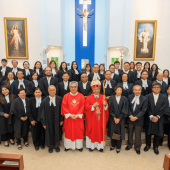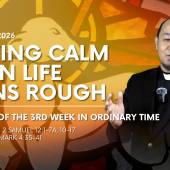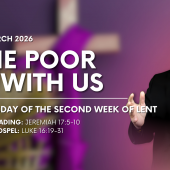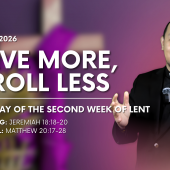Lord, increase our faith!

October 05, 2025 Twenty-seventh Sunday in Ordinary Time
Daily Readings: Habakkuk 1:2-3; 2:2-4; 2 Timothy 1:6-8, 13-14; Luke 17:5-10
Faith in God is one of the greatest gifts He gives us. This gift must be treasured and nurtured with patience, prayer, and persistence. The one who perseveres will reap a great harvest of blessings. That is why the Prophet Habakkuk declares that the righteous shall live by their faith. Jesus also teaches that only faith can guarantee salvation.
The First Reading, from the 6th-century Hebrew Minor Prophet Habakkuk, is presented as a dialogue. His writings reveal his struggle with God over rampant injustice and idolatry in Judah. Habakkuk directly addresses God and laments his ordeals. It seems to him that God does not listen, does not save, and leaves him to struggle with his pessimistic spirituality. He is disturbed by destruction, violence, strife, and contention. His haunting question is: How long will God remain silent and allow wickedness to flourish? (cf. Habakkuk 1:2–3).
The second part of the reading contains the Lord’s response. God assures the prophet that He has a plan for His people at the appointed time. It must be written down on tablets, clear, plain, and visible even to one who runs by. The proud are despised by God, for their spirit is not upright. But “the righteous live by their faith.” The proud are represented by the puffed-up and unrighteous Babylonians.
The Responsorial Psalm invites the people to sing, worship, and bow down before the Lord. They long to enter His presence with thanksgiving, making a joyful noise to their Maker. Using the shepherd-sheep metaphor, the psalmist declares: “We are the people of his pasture and the sheep of his hand” (Psalm 95:7). He also recalls God’s stern warning not to test Him, as the Israelites did at Meribah and Massah in the wilderness. The psalm thus calls for humble submission and obedience.
The Second Reading comes from St. Paul’s Second Letter to Timothy, the bishop of Ephesus, Paul’s close companion, colleague, and spiritual son. Timothy’s Jewish mother, Lois, and grandmother, Eunice, nurtured him in the faith. Paul reminds Timothy to “rekindle the gift of God” given through the laying on of hands and prayer. He urges him not to be afraid, for the Spirit he has received is one of power, love, and self-discipline. Paul even invites Timothy to join him in suffering for the Gospel, relying on God’s power. History shows that evangelizers often face opposition and hardship. Paul exhorts Timothy to:
- Hold fast to the sound teaching he received, and
- Guard the treasure entrusted to him with the help of the Holy Spirit.
Faithful adherence to the Gospel requires reliance on God rather than one’s own strength. What is entrusted in faith must be guarded with the utmost care.
We are also reminded that Patriarch Abraham is our father in faith. But do we truly recognize how much he struggled at times to remain faithful to God’s promises? At first, everything seemed impossible. He was promised a son at the age of 75, while Sarah had already passed her childbearing years. In his impatience, Abraham considered adopting his servant Eliezer as an heir, while Sarah sought a son through her maidservant Hagar. Yet both eventually surrendered to God’s will, and Isaac was born miraculously when Abraham was 100 years old.
The apostles’ plea to Jesus to “increase our faith” comes immediately after His challenging teaching on forgiveness and avoiding scandal. Jesus answers with the mustard seed analogy: even the smallest of faiths can work wonders, as seen in Abraham’s life.
A striking example of faith is found in St. Arnold Janssen, founder of the Society of the Divine Word. When skeptics doubted the congregation’s survival, he reportedly replied, “If this congregation grows and flourishes, I will give glory to God. If it does not, I will beat my breast and say, I am not worthy of it.” His words reflect deep humility, faith, and trust in divine providence. As disciples, we too must confess that we are “unworthy servants.” We do what is required of us, not for applause or recognition. If praise comes, we accept it humbly; if it does not, it does not matter.
Call to Action: When we are tested by trials and tribulations, only faith in God will save us. Faith gives meaning to our lives. Am I willing to understand and live in that way?
Radio Veritas Asia (RVA), a media platform of the Catholic Church, aims to share Christ. RVA started in 1969 as a continental Catholic radio station to serve Asian countries in their respective local language, thus earning the tag “the Voice of Asian Christianity.” Responding to the emerging context, RVA embraced media platforms to connect with the global Asian audience via its 21 language websites and various social media platforms.














